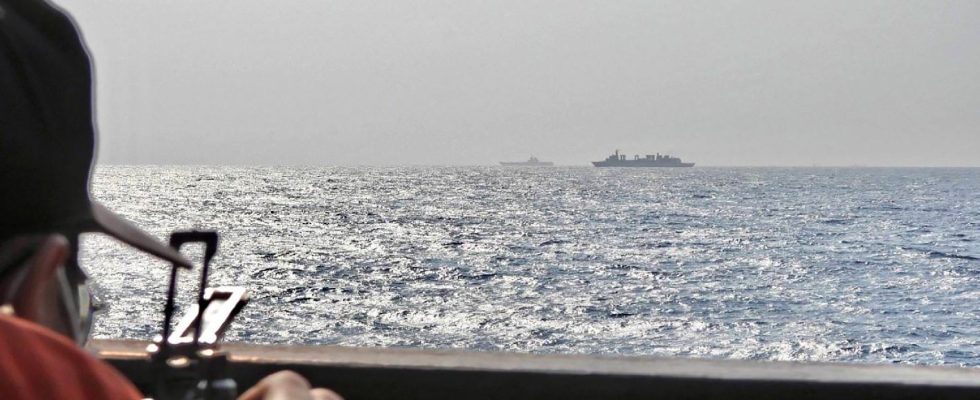Once again, the Chinese military threat hangs over Taiwan. Thursday, April 6, the island state announced that it had detected a Chinese helicopter and three warships near its coasts, in particular in the strait which separates it from the mainland. “A People’s Liberation Army aircraft and three People’s Liberation Army Navy vessels were detected at 6 am” local time (midnight French time), Taiwan’s Defense Minister said in a statement.
In recent months, deployments of Chinese military equipment in Taiwanese waters, as well as in its airspace, have multiplied. Most often under the pretext of a response, when Beijing does not tolerate certain diplomatic directions taken by the democratic autonomous island.
Facts
It didn’t take more than 24 hours for China to demonstrate its deep disagreement. On her way back from a tour of Central America, Taiwanese President Tsai Ing-wen met Kevin McCarthy, Speaker of the US House of Representatives, in California on Wednesday, hailing Washington’s “unwavering” support for Taiwan in the face of in Beijing. “The friendship between the peoples of Taiwan and the United States is of great importance to the free world and is essential to maintaining economic freedom, peace and regional stability,” Kevin McCarthy said after their meeting. encounter. It is “the first time that a Taiwanese leader has met the Speaker of the House, the third state figure, on American soil” since 1979, underlines the South China Morning Post.
Faced with what it considers to be a dangerous provocation, China promised Thursday morning a “determined” response. “In response to the grossly wrong acts of collusion between the United States and Taiwan, China will take resolute and effective measures to safeguard national sovereignty and territorial integrity,” the Chinese Foreign Ministry said in a statement released by the New China agency. The ministry urged Washington to “stop going down the wrong and dangerous path.” Hours later, China sent three warships to the waters around Taiwan, along with an aircraft carrier. For its part, Taiwan claims to have detected an anti-submarine helicopter crossing the air defense zone of the island.
The context
Beijing has always threatened a response if such a meeting takes place between the Taiwanese leader and American representatives. And for good reason: the communist regime considers the island self-managed for more than 70 years, as one of its provinces to take back, favoring a “peaceful reunification”, but without excluding the use of force. In the name of its “one China” principle, no country is supposed to maintain official ties with Beijing and Taipei at the same time.
Only 13 states still recognize Taiwan, including Belize and Guatemala, Latin American countries that Tsai Ing-wen has visited in recent days to cement the relationship with its few official allies. Washington severed diplomatic ties with Taipei in 1979 in favor of China, but has remained Taiwan’s strongest ally ever since. “We find ourselves once again in a world where democracy is under threat and where the urgency of keeping the beacon of freedom lit cannot be understated,” Tsai Ing-wen said alongside McCarthy, taking careful never to pronounce the words “China” or “Beijing”.
Kevin McCarthy meanwhile called for “continuing arms sales to Taiwan”, which are the “best way” to prevent a Chinese invasion of the island. “It’s an essential lesson that we learned from Ukraine, that the idea of simple sanctions in the future will not stop anyone,” he insisted to the press.
why it matters
Since the start of her term in 2016, Tsai Ing-wen, from a party that advocates independence, has become much closer to the United States. A direction that China deeply disapproves of. Last August, Beijing launched unprecedented military maneuvers around Taiwan, when Democrat Nancy Pelosi, Kevin McCarthy’s predecessor on the roost, dared to set foot on Taiwanese soil. At this stage China’s response is not comparable. However, it puts Taipei on alert.
The Taiwanese Minister of Defense has indeed deemed “sensitive” the deployment of Shandong, one of the two Chinese aircraft carriers. “When an aircraft carrier goes out, there are usually aircraft takeoffs and landings,” said Chiu Kuo-cheng, adding that no such maneuver had yet been observed. “We continue to monitor,” he warned the press. Asked about the possibility that this deployment is a prelude to Chinese military maneuvers, Chiu Kuo-Cheng replied: “We do not exclude this possibility.”
Furthermore, according to The Wall Street Journal, the meeting between Tsai Ing-wen and Kevin McCarthy could “further threaten the security of Taiwan and further aggravate relations between the United States and China, already in a downward spiral”. Nevertheless, some experts believe that “several factors, such as the fact that the meeting took place in the United States [et non à Taïwan] or that China is seeking to rethink its post-pandemic diplomacy” could push Beijing to “choose a less aggressive response than last year”, after Nancy Pelosi’s visit, nuance CNN.
